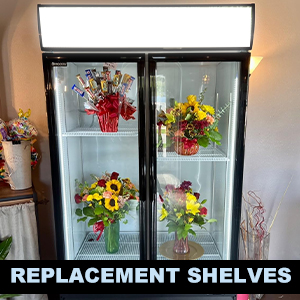Choosing the right freezer shelf rack is crucial for maximizing storage efficiency, organization, and accessibility in your freezer. With a plethora of options available in the market, making a well-informed decision can be overwhelming. This article serves as a comprehensive guide to help you navigate through the considerations and features that will best suit your specific needs.
Understanding Your Freezer Space
The first step in selecting the right freezer shelf rack is to understand the dimensions and layout of your freezer. Here are some factors to consider:
- Type of Freezer: Is it an upright or chest freezer? Each type has different advantages and spatial dynamics.
- Dimensions: Measure the height, width, and depth of your freezer to determine the maximum size of the shelf rack you can accommodate.
- Usable Space: Consider any obstructions inside the freezer, such as built-in shelves, ice makers, or cooling vents.
For instance, while upright freezers often have adjustable shelves, chest freezers require a more strategic approach since they have a large storage area but limited vertical space. Understanding these elements will lay the foundation for your selection process.
Identifying Your Storage Needs

Next, it’s vital to identify what you will be storing in your freezer. Different items require different types of storage solutions. Here are some common storage needs:
- Bulk Items: If you buy in bulk, you need racks that can handle larger boxes or bags.
- Small Containers: If you frequently freeze individual portions, consider racks with smaller compartments.
- Specialty Items: Items like ice cream tubs or frozen pizzas may require specific shelf designs.
For example, if you often freeze homemade meals, you might opt for a shelf rack that includes dividers or bins to keep the portions organized and easily accessible.
Material Matters
![[2 PACK] UPGRADED W11130203 Freezer Glass Shelf Replacement](https://m.media-amazon.com/images/S/aplus-media-library-service-media/7e3a0b72-4c83-44e5-adad-209bc553f5a8.__CR0,0,970,600_PT0_SX970_V1___.jpg)
The material of the freezer shelf rack is another significant factor to consider, as it affects durability, maintenance, and insulation. Here are common materials:
- Plastic: Lightweight and easy to clean, plastic racks are often less durable and can warp over time.
- Metal: Stainless steel or chrome racks are sturdy and long-lasting but may require more maintenance to prevent rust.
- Wood: While not commonly used in freezers, some wooden racks can provide a rustic aesthetic but may not be suitable for extreme cold.
According to a survey conducted by the National Association of Home Builders, 67% of homeowners prefer metal racks for their longevity and resistance to temperature fluctuations. Choosing the right material can greatly enhance the longevity of your freezer shelf rack.
Weight Capacity and Stability
![[2 PACK] UPGRADED W11130203 Freezer Glass Shelf Replacement](https://m.media-amazon.com/images/S/aplus-media-library-service-media/82675c6a-c451-4d58-a2ed-2163eaa34c13.__CR0,0,970,600_PT0_SX970_V1___.jpg)
Another crucial consideration is the weight capacity of the shelf rack. Ensure that it can support the weight of the items you plan to store. Here are some questions to ask:
- How much do your typical food items weigh? Consider the weight of bulk items like bags of frozen vegetables or meats.
- Is the rack stable enough? Look for racks that have a sturdy base and can withstand the weight without tipping over.
As a case study, a family that transitioned to bulk purchasing found that their plastic shelf racks were unable to hold the weight of the items, leading to a complete breakdown of the system. They switched to metal racks with a higher weight capacity, which improved their organization significantly.
Adjustability and Versatility
Freezer shelf racks with adjustable features can provide flexibility and maximize storage efficiency. Here’s why you should consider this:
- Customization: Adjustable shelves allow you to modify the height based on the size of the items you are storing.
- Future-proofing: As your storage needs change, adjustable racks can adapt without requiring a complete overhaul.
Many modern freezer racks come with adjustable brackets, which can be a game-changer for families whose food storage needs change seasonally. For example, a growing family might need to store more items during summer barbecues or holiday seasons.
Ease of Cleaning

Maintaining cleanliness in your freezer is essential for food safety and longevity. When choosing a freezer shelf rack, consider the following:
- Material: Select materials that are easy to wipe down and resistant to staining or odors.
- Design: Opt for racks that do not have hard-to-reach corners or grooves where dirt can accumulate.
A survey by the International Food Information Council found that 78% of consumers prioritize cleanliness in food storage solutions. Investing in a rack that is easy to clean can save you time and effort in the long run.
Cost Considerations

While it’s essential to make a sound investment, you must also consider your budget. Here are a few tips:
- Set a Budget: Determine how much you are willing to spend before you start shopping.
- Check Reviews: Look for customer reviews and ratings to assess durability and performance.
- Compare Prices: Shop around for the best deals but don’t sacrifice quality for a lower price.
According to a report by Statista, the average price of high-quality freezer racks ranges from $50 to $200, depending on size and material. Investing in a more expensive rack may pay off in durability and functionality over time.
Final Thoughts

Choosing the right freezer shelf rack requires careful consideration of your freezer space, storage needs, materials, weight capacity, adjustability, ease of cleaning, and cost. By taking the time to assess these factors, you can make an informed decision that enhances your freezer’s organization and efficiency.
In summary, remember the following key takeaways:
- Understand your freezer’s dimensions and layout.
- Identify your specific storage needs.
- Select the appropriate material for durability and maintenance.
- Ensure the rack’s weight capacity meets your storage requirements.
- Look for adjustable and versatile options.
- Prioritize ease of cleaning for long-term maintenance.
- Stay within your budget while comparing quality options.
By following these guidelines, you will be well-equipped to choose a freezer shelf rack that meets your needs and enhances your food storage experience. Happy organizing!